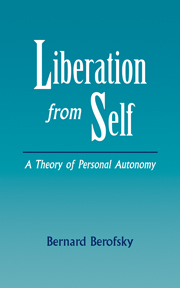Book contents
- Frontmatter
- Contents
- Liberation from self
- 1 Introduction
- 2 Freedom and autonomy
- 3 Freedom of action
- 4 Agent freedom
- 5 Values and the self
- 6 Autonomy and rationality
- 7 Rationality, values, and integrity
- 8 The liberation theory of autonomy: Objectivity
- 9 The liberation theory of autonomy: The place of self
- 10 The value of autonomy
- Notes
- Bibliography
- Index
1 - Introduction
Published online by Cambridge University Press: 16 September 2009
- Frontmatter
- Contents
- Liberation from self
- 1 Introduction
- 2 Freedom and autonomy
- 3 Freedom of action
- 4 Agent freedom
- 5 Values and the self
- 6 Autonomy and rationality
- 7 Rationality, values, and integrity
- 8 The liberation theory of autonomy: Objectivity
- 9 The liberation theory of autonomy: The place of self
- 10 The value of autonomy
- Notes
- Bibliography
- Index
Summary
Acts of God are not acts of God. They are sudden, unexpected, natural occurrences with a significant impact on human affairs. It is, therefore, not incoherent to contend, as I do, that autonomous agents are not individuals whose actions and decisions are self-directed. I hasten to add that this negative conclusion about autonomy is not just fallout from the rejection of the very project of theorizing about the self. It is rather a result which is forced on us by the convergence of a variety of considerations, including powerful intuitions about particular cases.
Taking etymology seriously, we begin, like everyone else, with the assumption that autonomy is self-direction and embark on a search for the difference between self and other. When William Blier, a member of David Koresh's cult, acquiesced in his own suicide, he was acting from motives, values, and beliefs that were inculcated from without in a way which made him a virtual paradigm of heteronomy. Although Blier's action was inspired by motives that were in a sense his, that were among other things accessible to him in the unique way any person knows her own mental states, we rightly hesitate to describe his behavior as self-directed. His submission to another person – Koresh – was as complete as is possible for a human creature.
- Type
- Chapter
- Information
- Liberation from SelfA Theory of Personal Autonomy, pp. 1 - 15Publisher: Cambridge University PressPrint publication year: 1995



